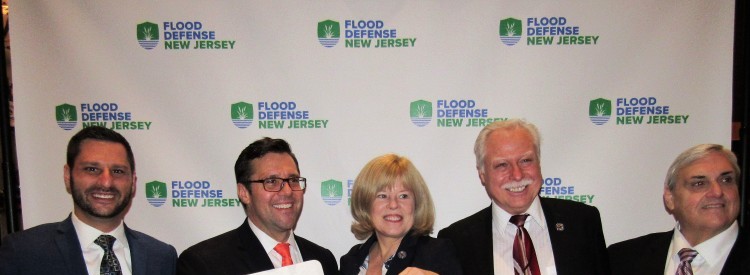Green groups give Murphy mixed scores after his first year in office
News Article • • by Danielle Muoio at Politico
Two influential environmental groups gave Gov. Phil Murphy mixed reviews for his first year in Trenton, but both agreed the progress he initially made on key environmental issues has declined since his first 100 days in office.
The New Jersey Sierra Club issued a scathing scorecard on Monday, giving the Democratic governor a “D” for what it said was a “a lack of leadership on many key issues.” Murphy fared better last week with the New Jersey League of Conservation Voters, which gave him a “B+” for enacting “a whirlwind of pro-environmental actions and commitments to conservation.”
New Jersey LCV Ed Fund Grades Murphy on First Year Achievements
Press Release •
TRENTON, NJ- New Jersey League of Conservation Voters Education Fund (Fund), a statewide organization dedicated to preserving our environment, announced its scoring of the Murphy Administration on the Governor’s first year in office. The score reflects the environmental achievements of Governor Phil Murphy.
Coastal Congress members move to ban offshore drilling
News Article • • by Michelle Brunetti Post at Press of Atlantic City
WASHINGTON, D.C. — Seven members of the House of Representatives, including New Jersey’s Frank Pallone, D-6th, said Tuesday they will introduce legislation to block the Trump administration from expanding offshore drilling for gas and oil.
GREEN GROUPS: PROPOSED OVERHAUL OF STORMWATER RULES DOESN’T GO FAR ENOUGH
News Article • • by Tom Johnson at NJ Spotlight
The state is proposing to overhaul one of the most contentious rules adopted by the Christie administration, but critics say it falls short in dealing with the single biggest problem impairing New Jersey’s waters — stormwater runoff.
The proposal, the first major regulation offered by the state Department of Environmental Protection under Gov. Phil Murphy, mostly amends rules involving stormwater management, an issue often blamed for increasing the risk of flooding and threatening water quality.
New Jersey LCV Statement on Attorney General, DEP joining multistate lawsuit against seismic testing
Press Release •

BELMAR, NJ- Ed Potosnak, Executive Director of New Jersey League of Conservation Voters, released the following statement today on the Attorney General & Department of Environmental Protection's announcement of New Jersey joining a multistate lawsuit to reverse federal approval of seismic testing along the eastern seaboard and demand evidence justifying Florida's exemption from offshore drilling:
We cannot allow President Trump’s anti-environmental and pro-polluter agenda to destroy our economy or our environment. The Jersey Shore tourism industry is a $44 billion economic engine and supports more than 838,000 jobs, including vibrant commercial and recreational fishing industries. We commend the Attorney General and DEP Commissioner for taking these important actions to protect our environment, critical coastal economy, and shore communities from dangerous offshore fossil fuel extraction.
###
New Jersey LCV Statement on NJ Entering Transportation and Climate Initiative
Press Release •
Ed Potosnak, Executive Director of New Jersey League of Conservation Voters, released the following statement today on New Jersey joining the Transportation and Climate Initiative:
“Governor Murphy and his administration have once again demonstrated their commitment to protecting our environment by joining the Transportation and Climate Initiative. By joining this regional transportation initiative, not only does it seek to reduce carbon emissions, it also drives infrastructure investments that will improve commutes, create good local jobs, and grow reliable and affordable transportation options for all New Jerseyans.”
NEW JERSEY LCV STATEMENT ON THE ATTORNEY GENERAL’S AND NEW JERSEY DEP’S MAJOR CIVIL ENFORCEMENT ACTIONS
Press Release •
CAMDEN, NJ—Ed Potosnak, Executive Director of New Jersey League of Conservation Voters, released the following statement today on the Attorney General’s Office and Department of Environmental Protection’s announcement of major civil enforcement actions, including Natural Resource Damage lawsuits:
New Coalition Seeks to Protect Communities from Flooding and Pollution
Press Release •

“Flood Defense New Jersey wants to empower our communities to help them address the growing threat of stormwater,” says Ed Potosnak, executive director of New Jersey LCV. “Local flooding is a huge problem and local leaders want the ability to protect their communities from it. The coalition is working to give them a tool to do just that.”
Leading Political Environmental Group Endorsees WIN in New Jersey Special Elections
Press Release •
“The environment was on the ballot today in New Jersey – and around the country,” said Ed Potosnak, Executive Director of New Jersey LCV. “Voters made it clear up and down the ballot – and in extraordinary fashion – that we will not stand idly by as the Trump administration continues to wreak havoc on common-sense protections for our environment and public health. We are thrilled to see these environmental champions solidify their place in the General Assembly for another year, and we know they will work tirelessly to continue moving New Jersey toward our clean energy future.”
Worry Wards: How might environmental anxiety impact the midterm elections?
News Article • • by Jesse Nichols at Grist
Earlier this fall, the world’s top climate scientists gave humanity about 10 years to avoid a future that really sucks. With the midterm elections right around the corner, that warning means voters are effectively deciding which candidates to trust with the keys to the climate. If voters are sufficiently worried about warming, that anxiety might help determine who is put in office.
According to Anthony Leiserowitz, director of the Yale Program on Climate Change Communication, worry is a stronger predictor of policy support than other emotions. “We found that it’s not fear, it’s not anger, and it’s not disgust or guilt,” he explained. “Worry doesn’t hijack, doesn’t overwhelm, rationality. It can really spur it.”
So just how worried about the planet’s future are voters in the nation’s tightest congressional races? Grist created a map overlaying competitive elections, as identified by The Cook Political Report, with climate concern data from Yale’s 2018 Climate Opinion Maps.